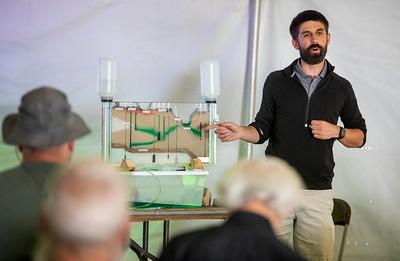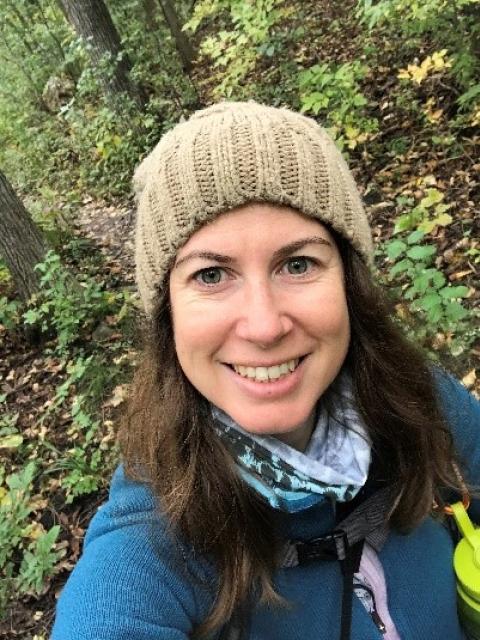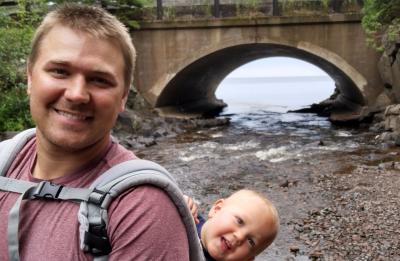Red Cedar Watershed Conference
Thursday, March 14, 2024
8:30 a.m.-4:00 p.m.

2024 Opening Keynote
8:45-9:45 a.m.
Groundwater Quality in the Red Cedar Watershed
Kevin Masarik, Groundwater Education Specialist, UW-Stevens Point
Nearly 3 out of 4 Wisconsinites rely on groundwater as their primary water supply. Municipal water supplies are regularly monitored and have an obligation to meet drinking water standards. Meanwhile, private well owners must act as their own water utility manager when it comes to day-to-day decisions about their household wells. Changes in land use, new industries, increases to population and a changing climate all make groundwater management an increasingly important consideration for Wisconsin communities. Both community leaders and rural landowners have a need for accessible groundwater quality information if they are expected to effectively manage their water supply.
This presentation will highlight past and present efforts to collect data on groundwater quality, including where and how to locate baseline data. We will explore the complex relationship between land-use, geology, soils and groundwater quality concerns such as nitrate, bacteria, arsenic, and phosphorus. Using examples from local communities we will also highlight more advanced and systematic monitoring that some communities have been performing that allows for creation of predictive tools or determination of trends. This presentation hopes to increase participants’ understanding of where our drinking water comes, highlight the important connection between groundwater and surface waters, and provide insight into current efforts to collect and utilize data.
Kevin Masarik is a groundwater education specialist with the University of Wisconsin-Extension and University of Wisconsin-Stevens Point. For the past 20 years, he has assisted tens of thousands of well owners in testing their water through locally organized well water testing programs. The benefits of these programs are two fold; individual well owners are able have a better understanding of their individual well water quality and overtime the results have helped paint a detailed picture of water quality across Wisconsin. He uses information learned from his outreach and other research efforts to educate communities across the state about the effects of land-use on groundwater.

2024 Afternoon Keynote
12:05-1:05 p.m.
Clean Water, a Clear Asset for Wisconsin’s Economy
Cassie Mordini, Community Development and Communications Specialist, Wisconsin Office of Outdoor Recreation
Wisconsin’s tourism and outdoor industries are major drivers of the state’s economy. Hear how clean, clear water plays an essential role in both, supporting businesses, attracting visitors, and creating a quality of life for Wisconsinites that is unmatched.
Cassie Mordini is the Community Development and Communications Specialist with the Wisconsin Office of Outdoor Recreation. Created by the Department of Tourism, the Office is charged with supporting and uplifting Wisconsin’s diverse outdoor recreation industry for the benefit of all. Cassie manages the Office’s industry communications and supports program and resource development as well as stakeholder outreach. Her professional background in relationship building, communications and marketing for environmental nonprofits paired with her experience as a longtime REI sales specialist is a testament to her passion for the outdoors. She feels truly privileged to channel her experiences and passion into her work strengthening the outdoor industry. A lifelong Wisconsinite who grew up building forts in the woods and spending summer weekends on the river, Cassie has a deep appreciation for the natural wonders of the state and endeavors to show it all to her two kids, with husband and dog in tow. When asked what her favorite activity is, she’ll tell you, “Anything outside.”

2024 Final Keynote
2:45-3:45 p.m.
Preventing Erosion and Runoff: Lessons Learned on Wisconsin’s National Forest
Chris Ester, Hydrologist, U.S. Forest Service
Forest Lands comprise nearly 40% of the Red Cedar watershed and function as critical headwater areas to many of the Red Cedar’s tributaries. Forest lands can source significant sediment and nutrients to waterways if key best management practices are not applied. Drawing from the successes and failures of watershed management over the past 30 years on the Chequamegon-Nicolet National Forest, this keynote address will explain critical forest management practices to prevent erosion and increased runoff from forest lands.
Chris Ester is passionate about water resources and feels blessed to work with the U.S. Forest Service where he can help to provide the "greatest good for the greatest number of people in the long run" (Gifford Pinchot). Fluvial geomorphology (the study of river process and form) and wildland hydrology (what happens when it rains in the woods) are his primary fields of study and application, watershed restoration being the mission. Toward that end, his work focuses on road stream crossing restoration and natural stream channel design to enhance and protect water resources in the Chequamegon - Nicolet National Forest.
2024 Breakout Presentations
Morning Session Block
10:15-11:05 a.m.
A Closer Look at Local Groundwater Monitoring Programs
Are you curious about the quality of the water we depend on? Groundwater, that is, our drinking water. Barron, Chippewa and Dunn Counties have all been active in administering groundwater monitoring programs. This session will take a closer look at the investment and outcomes of each local program.
Presenters:
Chase Cummings, County Conservationist, Dunn County
Tyler Gruetzmacher, County Conservationist, Barron County
Lynda Schweikert, County Conservationist/Deputy Director, Chippewa County
Heather Wood, Water Resources Specialist, Dunn County
Practical Application of Water Quality Best Management Practices for Timber Harvesting
This session will highlight the typical best management practices used during and after a timber harvest. These best management practices are important for water quality protection and can be implemented by private forest landowners.
Presenter:
Rob Strand, DNR Forester, Menomonie Field Office
Biography:
Rob is a long-time resident of Dunn County and has worked as a forester here since 2002. In addition to his career as a DNR forester, he's a woodland owner myself. He understands the challenges and opportunities as the custodian of a piece of Wisconsin’s rural landscape. He finds helping landowners achieve their forest objectives as the most rewarding part of being a forester.
What we know about PFAS in Wisconsin surface waters and connections to food webs.
Since the 1950s a large group of human-made chemicals, known as PFAS or perfluoroalkyl and polyfluoroalkyl substances, have been used in industry and consumer products worldwide. This session will explore what we know about PFAS concentrations in our Wisconsin surface water systems and will take a deeper dive into the main exposure routes and impacts these concentrations may have on our environment.
Presenter:
Patrick Gorski, PhD Emerging Contaminants Research Scientist, Bureau of Water Quality (DNR)
Afternoon Session Block
1:40-2:30 p.m.
Meeting Water Quality Goals in the Red Cedar Watershed through Collaborative Landscape Design
For those who live in the Red Cedar Watershed there are growing desires to dramatically improve both surface and ground water quality. While there are many causes to diminished water quality, the biggest contributor is non-point source Nitrogen and Phosphorus pollution. While it can be easy to blame farmers for these short comings, these poor outcomes are indicative of a societal level problem. Aware of the need for societal level solutions, the Red Cedar Learning Hub is engaging in a pilot project to explore transformative change through the processes of Collaborative Landscape Design (CLD). CLD is a deliberative process where communities come together to develop and act upon a shared vision for the future. We seek to detail the regional place-making processes of CLD and provide an update on the status of the Red Cedar Learning Hub.
Presenter:
John Strauser, Human Geographer, UW-Madison
 John earned his PhD from the University of Illinois at Urbana-Champaign in Natural Resources and Environmental Sciences. He currently serves as a Scientist in the Department of Plant and Agroecosystems at the University of Wisconsin-Madison. His research and outreach focus on the social processes that drive bio-physical landscape change by employing the concepts of place and place-making. In his free time, John loves fishing, swimming, biking, and casual conversations with friends and colleagues.
John earned his PhD from the University of Illinois at Urbana-Champaign in Natural Resources and Environmental Sciences. He currently serves as a Scientist in the Department of Plant and Agroecosystems at the University of Wisconsin-Madison. His research and outreach focus on the social processes that drive bio-physical landscape change by employing the concepts of place and place-making. In his free time, John loves fishing, swimming, biking, and casual conversations with friends and colleagues.
Understanding the Nitrogen Optimization Pilot Program and what we've learned from our first season.
The Nitrogen Optimization Pilot Program (NOPP) is a collaboration with agricultural producers, Producer-Led Watershed Groups, University of Wisconsin System scientists, County Land & Water Conservation Departments, and other partners to conduct research projects that enhance the understanding of and refine new methods for optimizing nitrogen applied to agricultural fields and decreasing nitrogen loss to the atmosphere, groundwater and surface water. Hear from a local agronomist, Land and Water Conservation staff, and University of Wisconsin partners about two NOPP projects in the Red Cedar Watershed.
Presenters:
Joe Ailts, Biological Agronomist, Independent Crop Consultant
Tina Barone, Conservation Planner, Dunn County
Lindsay Rushford, Outreach Specialist, UW-Madison Division of Extension
Monica Schauer, Research Director- Nitrogen Optimization Pilot Program
Improving Local Public Health Capacity to Address Environmental Hazards Affecting Wisconsin's Drinking Water
In 2020, the Wisconsin Department of Health Services received funding from the Centers for Disease Control and Prevention to enhance the capacity to identify, control, and prevent the environmental health hazards that prevent Wisconsinites from living, working, and playing in healthy spaces. The Environmental Health Capacity program works to accomplish this mission by researching factors that affect environmental health hazards, inventorying and evaluating environmental data systems, supporting local projects to put effective interventions in place, and developing tools and resources for state partners. During our session, we will share how we are working with local health departments to address and prevent hazards that impact Wisconsin’s drinking water. First, we will describe two completed county projects. Vernon County’s public health and conservation departments worked together to set up a nitrate testing laboratory and installed watershed boundary signage. Monroe County installed river and stream water level monitoring equipment. Then we will describe two new projects focused on addressing groundwater depletion in Rock County and improving drinking water data access in Eau Claire County. For the second half of the session, we will encourage participants to share with each other their experiences or lessons learned about addressing water hazards in their communities.
Presenter:
Jacquie Cronin, MPH, Environmental Health Capacity Program, WI Department of Health Services




